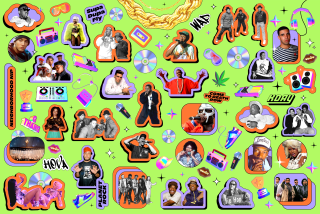Hear how the Game compares
- Share via
The Game
“Doctor’s Advocate” (Geffen)
* 1/2
TALLYING the Game’s lyrical name-dropping is close to becoming a hip-hop drinking game. With “Doctor’s Advocate,” as with his debut, “The Documentary” (2005), fans track the Game’s repeated comparisons to storied peers, whether Biggie’s five mentions, Snoop Dogg’s eight or Dr. Dre’s record-setting 40.
The Game’s self-referencing vis-a-vis other rappers can grow tiring, but it also reveals how his gangsta pose masks the heart of a rap nerd -- someone who’d giddily rhyme, “I’m the West Coast Rakim,” as if anyone under 25 would get the reference. That exuberance and cocksure attitude, complemented by a broad musical palette, fueled “The Documentary’s” success and also powers “Doctor’s Advocate” (out Tuesday) ... to a point.
Any fears that the Game’s beef with former mentor 50 Cent would doom the new CD are misplaced. There’s nothing here as catchy as last year’s hit “Hate It or Love It,” but there’s no shortage of good hooks or vigorous rhythms. Scott Storch offers up a pair of club-ready hits with “Let’s Ride” and “Too Much,” Just Blaze lights up the soulful “Why You Hate the Game,” and will.i.am packs the hometown anthem “Compton” with fight-inciting aggression. Meanwhile, the Game tightens his brusque, baritone flow and improves his wordplay, holding his own with such guests as Xzibit and Tha Dogg Pound while showcasing a matured lyricism on the elegiac, “Ol’ English” and cleverly written “It’s Okay (One Blood).”
What haunts and undermines the album is how the absence of its titular inspiration becomes hyper-present. The back story behind Dr. Dre’s recusal is worth a few, elaborative bars, but the Game quickly exhausts the topic with incessant, contradictory boasts: “I’ll never fall off / even without the Doc” vs. “I’m the heir to the Aftermath dynasty.” This internal conflict bubbles over on the overwrought title track, an apology addressed to Dre -- with Busta Rhymes guesting as a character witness no less -- that can’t decide between soul-baring sincerity or drunk-dialed irony.
The confessional mode has been a hallmark for rappers including Eminem and Tupac Shakur, but the Game hasn’t yet mastered their balance of vulnerability and bravado. Instead, his awkward attempt to assert independence while avoiding burnt bridges drags on an otherwise likable effort. He may compare himself to a pantheon of hip-hop’s greatest, but he’s not ready to take a seat at the table yet.
Oliver Wang
*
Albums are rated on a scale of four stars (excellent), three stars (good), two stars (fair) and one star (poor).
More to Read
The biggest entertainment stories
Get our big stories about Hollywood, film, television, music, arts, culture and more right in your inbox as soon as they publish.
You may occasionally receive promotional content from the Los Angeles Times.










